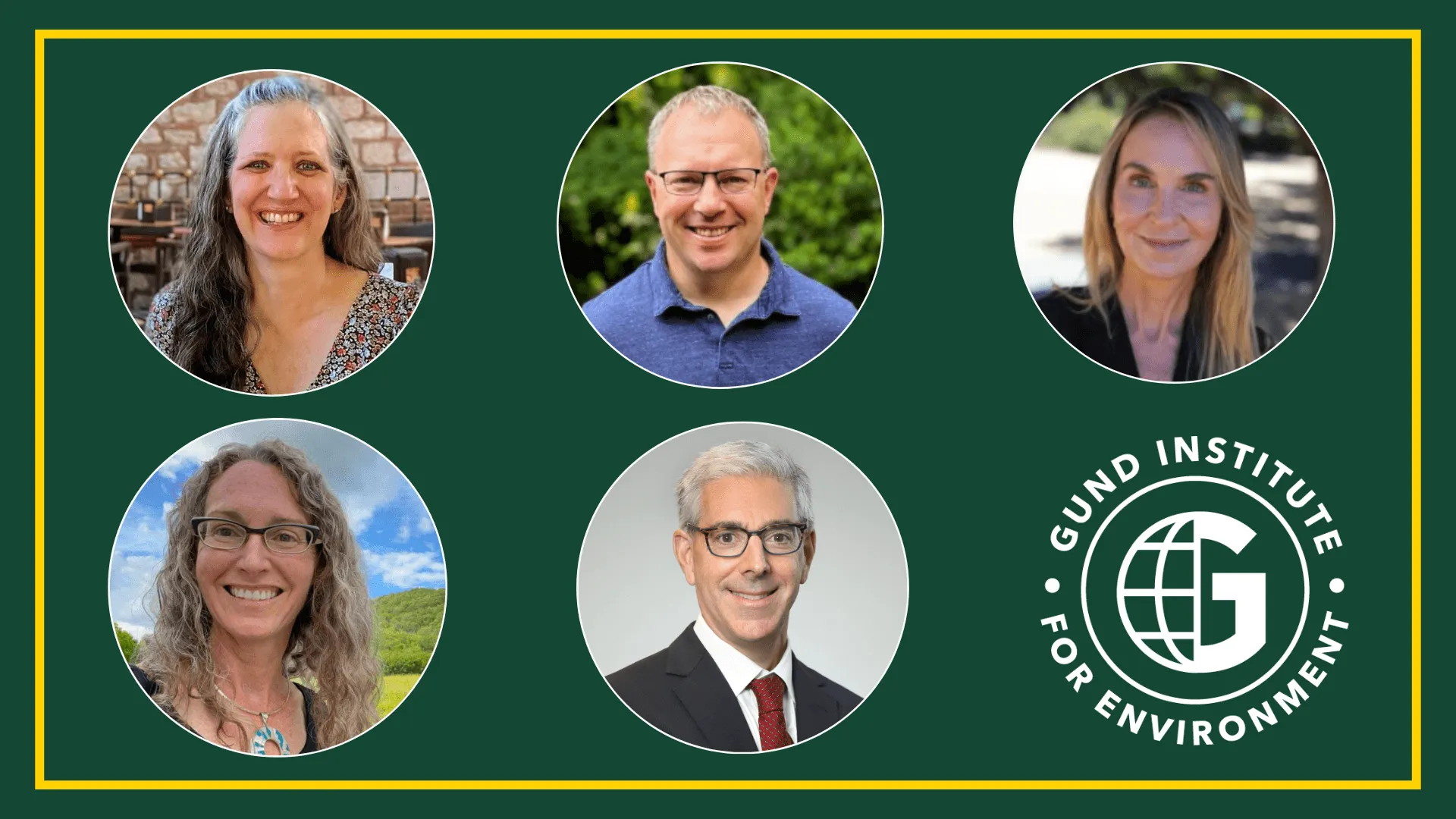The Gund Institute for Environment this fall is welcoming five researchers to the University of Vermont through the Macmillan Visiting Scholars program.
The program, established by a generous gift from the Macmillan family in 2003 and managed by the Gund Institute since 2019, aims to “broaden our understanding of the physical and natural sciences, their relationship to other academic disciplines, and to close the gap between the sciences and the rest of the academic community.”
Visiting Scholars, who are nominated by Gund Faculty Fellows, spend anywhere from two days to two semesters at UVM. They contribute to the scholarly excellence of the Gund Institute and UVM through presentations, collaboration, informal mentorship and research.
Since the start of 2025, the Gund Institute has expanded the program to respond to federal attacks on science in the United States.
“For at least the next year, we will use some of our Macmillan Visiting Scholars program funds to support federal scientists and leaders who have been recently forced from their jobs,” said Taylor Ricketts, director of the Gund Institute. “Amid all the dark federal clouds of uncertainty, being able to support and engage with these remarkable leaders is a small silver lining.”
Three of this fall’s five Macmillan Visiting Scholars worked in the federal government until recently.
Learn more about the Macmillan Scholars visiting campus this fall and mark your calendars for their public talks.
Nicole Ardoin is an Associate Professor of Environmental Behavioral Sciences in the Environmental Social Sciences Department of the Stanford Doerr School of Sustainability. She leads Stanford’s Social Ecology Lab, which focuses on “motivations for and barriers to environmental behavior at the individual and collective scales.” Ardoin is a leading researcher and practitioner in the realm of integrating epistemologically diverse approaches into highly applied, practical work. Additionally, she is a trustee of the California Academy of Sciences, sits on NatureBridge's Education Advisory Council and is an associate editor of two academic journals, "People and Nature" and "Environmental Education Research".
John Balbus is the Principal of Climate Care Consulting, LLC and former Health and Human Services Deputy Assistant Secretary for Climate Change and Health Equity. Trained as a physician in Internal, Occupational and Environmental Medicine, he has devoted his professional career to understanding and addressing the health implications of climate change. He established and directed the HHS Office of Climate Change and Health Equity after serving 12 years as Senior Advisor for Public Health at the National Institute for Environmental Health Sciences. Balbus was elected to the National Academy of Medicine in 2021. He will visit from Sept. 29 to Oct. 3. Balbus will give a public talk on how to design a healthcare system in the face of a changing climate on Oct. 3 from 12-1 p.m. in Farrell Hall room 006.
Elizabeth Daut was until recently a Natural Resources Officer in the Biodiversity Division at the U.S. Agency for International Development where she led USAID’s One Health Working Group and launched the South American Network for One Health. Prior to joining USAID, Daut ran an environmental NGO in Ecuador for almost 10 years, initially as a Peace Corps volunteer. Daut has a Ph.D. from Texas A&M University and a D.V.M. degree from Cornell University. She visited in the spring and will again visit Sept. 9-19 and Oct. 20-24. Daut’s public talk on the future of planetary health research is scheduled for Sept. 19 from 12-1 p.m., in Farrell Hall room 006. Watch the YouTube recording here.
Cynthia Gill is a global conservation advocate and a leadership and transition coach. Gill built and led the conservation sector at USAID for 25 years, leading strategic direction and overseeing $500 million annual investment. She also led and invested in organizational and human development and wellness. Gill holds a Masters of Environmental Management from Duke University and is an accredited coach who has coached nearly 50 clients through the turmoil of 2025. She will visit from August 4 to Nov. 21. Her public talk on reimagining global conservation is scheduled for Sept. 12 from 12-1 p.m. in Farrell Hall room 006. Watch the YouTube recording here.
Eric Lonsdorf is an associate professor of Environmental Sciences at Emory University. He was previously a lead scientist with the University of Minnesota-based Natural Capital Project team. Using structured decision-making, he develops ecological models as part of a process to inform decisions in conservation biology and natural resource management made under uncertainty and often with limited resources. Lonsdorf leads the model development and applications of the services wild bees provides to crops and co-leads the NatCap Livable Cities team. Lonsdorf earned a B.A. from Carleton College and a Ph.D. in Ecology, Evolution and Behavior from the University of Minnesota. He will visit from Sept. 2-12 and Oct. 27-Nov. 7. Lonsdorf will give a public talk on spatial systems modeling on Sept.5 from 12-1 p.m. in Farrell Hall room 006. Watch the YouTube recording here.
You can learn more about the program and nominate a Macmillan Scholar. Nominations are accepted on a rolling basis.
About the Gund Institute: The Gund Institute for Environment at the University of Vermont is a research center dedicated to understanding and tackling the world’s most critical environmental challenges. Driven by the belief that research should inspire action, the Institute takes a cross-sector approach to solving environmental issues with stakeholders from government, business, and broader society. The Institute focuses on five interconnected research themes: climate solutions, sustainable agriculture, health and well-being, equity and justice, and resilient communities. With 300 scholars in Vermont and across the world, the Institute brings together a network of internationally recognized researchers from diverse disciplines, including the natural and social sciences, business, health, technology, engineering, and the humanities.
